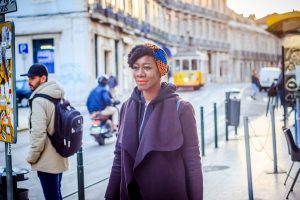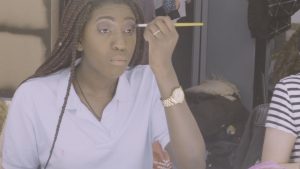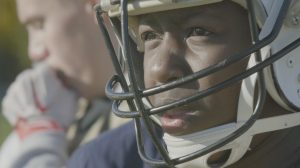Samira – An Interview with Lainey Richardson
Winner of the ‘Best Short Short Award’ at The London Independent Film Festival 2019 in April, Samira is Lainey Richardson’s self-funded snapshot into the life of a young woman coming of age. Here, Lainey fills Afropean in on the process of making Samira.
Tell us a bit about yourself. What made you want to be a filmmaker and where/how did you train?
I’m a half Ghanaian half Jamaican born and bred Londoner and filmmaker. Films have always been a big part of my life, stemming from Friday film nights which my brother, his friend, my mum and I had every week from about the age of 4… I think that’s where the seed was planted – watching Kung Fu films and horrors and anything we could get our hands on. I saw David Lynch’s Elephant Man when I was about 5 – I know… crazy when you think about my age! But it wasn’t until I discovered the world of arthouse films when I was 13 that I had that eureka moment and knew I wanted to pursue filmmaking as a career. So, I got myself my first work placement as a runner in a production company by 15 while still at school. And later went to art school and spent a lot of my time there playing around with conceptual documentary video. And I’ve spent the last 10 years working in the moving image industries, making short films independently on the side.
What originally inspired the making of the film?
I really wanted to make a short documentary about a strong woman of colour to challenge conventional representations of people of colour on screen, specifically black women, and to give us more visibility and show us in a positive light. Things have started to change a lot recently, but at the time I was really yearning to see more people that looked like me on screen, and I know we exist, I see us all the time in real life! But as I’m a filmmaker, rather than being bitter and complaining, it just made sense to me to try and create the difference I wanted to see myself… at the very least, it would be a cathartic experience for me.
I ended up finding 19-year-old Samira Conteh, the young woman I made the documentary portrait about, through my younger sister. My sister coincidentally showed me a picture of Samira who had just joined Kent University’s 98-strong all-male American football team. It was the team photo with all the players lined up in tiered rows on the pitch in their American football gear, and I just saw Samira’s face with the biggest grin amidst a sea of men, and I just thought, that is her!
How long was the work in development? Could you describe the process and methodology of the production?
My development stage consisted of an initial interview with Samira in her childhood bedroom in London, and off the back of that I wrote a treatment, an outline, a shot wishlist, and I cut a short mood film so I’d have a clear visual reminder of the kind of piece I was trying to create. On the producing side it was more getting permissions and access to spaces and people etc.
I ended up shooting Samira in Kent very on and off over 2 years. It definitely was not my intention for the piece to take so long to finish! It’s such a short piece at 3 minutes but I was really battling with my inner demons to complete it, and I credit my friends and family for encouraging me to get to the finish line.
What kind of equipment did you use? What was the reason behind the choice?
I shot on the LUMIX GH4 with 2 cine lenses for the most part which I purchased specifically so I’d be able to make this film. And I hired a Sony A7S with a DJI Ronin gimbal for the skating shots. Affordability was key for me, as well as being able to rig the camera up to shoot and record sound easily as a one-woman-band on the move. And then of course the aesthetic potential.
What were the biggest challenges?
Making a short film on next to nothing gives rise to loads of challenges. On this shoot taking on multiple roles as the producer, director, principal camerawoman and soundwoman was an ambitious move especially as I’d never shot a film before. You can spread yourself too thin sometimes, and there’s also just something so beautiful about collaborating that I really missed, as well as that team spirit that gives you momentum and excitement to keep going while you’re shooting. Also learning to use the kit while making this film was interesting too. It was great that Samira was really chilled about me filming her, so it created this really safe space for me to experiment and make mistakes, knowing she’d be cool if I needed to shoot again.
How was the project funded?
I only applied to one short film fund which I didn’t get, but on doing the application I really felt psyched to go and shoot it immediately, so rather than losing more time doing applications, I just dived in and figured I’d figure it all out as I went along. So the project ended up being totally self-funded. I spent my savings on buying camera equipment and covered the costs of production and post, which is another reason why it took so long to finish – I just filmed Samira whenever I had spare time and cash. But I must add that I’m also unbelievably lucky to have some incredibly talented friends who worked on the short and helped me make it what it is, some who worked for free and others for basically nothing in comparison to their contributions to the project. Shoutout to my brilliant editor Ben Canny and brilliant composer Guy Wood.
Do you have any new projects you’re developing? What can we look forward to?
I’m really keen on doing a narrative piece next and have a couple of short drama scripts I’m working on which are both inspired by personal experiences. One that’s centred around a race-related incident in an Afro-Caribbean hair shop, and the other questions the lengths we’ll go to to earn a living to maintain our lifestyles. This one is based on a weird period in my life where I was doing the strangest clinical trials to supplement my income in my early twenties as I was so broke, but then I’d often spend the money on going out and partying. I’m really curious to explore the notion of being on the poverty line, whilst still being susceptible to the social pressures to have, be and do more, and what that does to your psyche… like is it better to have money and no life, or to have a life but no money?
What tips do you have for any young filmmakers from underrepresented / economically disadvantaged communities?
If you’re a young filmmaker from an under-represented or economically disadvantaged community, then one of the things you might not have is the privilege of “contacts”, which are so vital. So allocate some time to work on developing your network regularly. Go to networking events, film festivals, meet-ups – be that person who introduces themselves to new people. Give them your card, or better yet, follow them on Instagram and ask if they’ll follow you back. I’m actually not a huge fan of social media at all but using Instagram in this way has actually lead to me becoming friends and having more of a support network with other creatives online over time, as it keeps you in the loop on each others creative happenings without much effort on your part, and it feels less intimidating to drop someone a DM once in a while. I also suggest getting a mentor or even just emailing people you admire for advice when needed. – You’d be surprised at how many people will be willing to actually meet you for an informal coffee and share their insider tips and info. All of this costs nothing, but will make a big difference. Just be gracious while you’re doing it.
In addition, I’d say be tenacious – you need almost dogged self-belief.
Make friends with rejection. It’s always going to be a part of the process no matter what stage of career you’re at, and it’s not necessarily personal. And if it is personal, go find other people who get what you’re about and what you’re doing.
Practice self-care! Filmmaking is intense and can be mentally, physically and emotionally taxing, so make sure you’re looking after yourself.
Don’t compromise who you are. In fact, channel who you are, it’s what’ll make you stand out.
And most importantly, just start making films. The more the better. I see each film I make like a term at film school. So, you have to keep showing up if you want to get better at.
Can you share work from some of your favourite Afropean directors/ filmmakers, past or present?
One of my favourite artist-filmmakers at the moment is Jenn Nkiru. I loved Rebirth is Necessary and I’m really looking forward to seeing her documentary “Black to Techno”. Dee Rees made an impression on me with her film Pariah back in 2011 and I’m always keen to see anything she puts out. And I of course love the work of Barry Jenkins and Steve McQueen.
How do people get in touch with you if they want to screen your film?
If you want to screen my doc Samira, feel free to contact me through my website: www.laineyrichardsonfilms.com
Follow me on Instagram: @laineyfromlondon
And to stay in the loop with screenings the film’s Facebook page is @samiradocumentary
Lainey Richardson – Director
Film: Samira, Doc, UK, 3 mins, 2018





